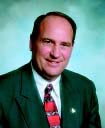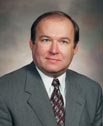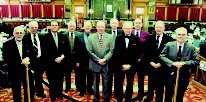|
| |||||||||||||||||
|
IOWA OFFICIAL REGISTER | |||||||||||||||||
|
78th GENERAL ASSEMBLY 1999-2000 | |||||||||||||||||

|

| ||||||||||||||||
|
President of the Senate
Mary Kramer (R) |
Speaker of the House
Brent Siegrist (R) | ||||||||||||||||

|

| ||||||||||||||||
|
Senate Majority Leader
Stewart Iverson, Jr. (R) |
House Majority Leader
Christopher Rants (R) | ||||||||||||||||
 Senate Minority Leader Mike Gronstal (D) |

House Minority Leader
David Schrader (D) | ||||||||||||||||
|
THE LEGISLATIVE BRANCH Statehouse, Des Moines 50319 www.legis.state.ia.us
Organization The constitution places the legislative authority of Iowa government in a General Assembly made up of a Senate and a House of Representatives, and limits the membership to no more than 50 senators and 100 representatives, which is the present size. The General Assembly is the lawmaking body of state government. A constitutional provision that no money be spent from the state's treasury unless the General Assembly writes a law to do so is the basis of the legislature's power of the purse. The assembly also has the power to call itself into special session upon written request made to the presiding officers of both houses by two-thirds of the members of both. The sole power of impeachment is vested in the House of Representatives with the power to try impeachments vested in the Senate.
Qualifications for Office A state representative must be at least 21 years of age, and a state senator at least 25 years of age at the time he or she takes office. The other qualifications for the office of legislator are U.S. citizenship, Iowa residency for at least one year and district residency of 60 days prior to election. Representatives are elected to two-year terms; senators are elected to four-year terms. Presently, half of the 50 senators' terms expire every two years.
Compensation Members of the General Assembly are paid $20,758 annually; round trips between home and state capitol and a per diem allowance for expense of office during the legislative sessions. The annual salary for the speaker of the house, the house majority and house minority is $32,014. The annual salary for the president of the senate, the senate majority and senate minority leaders is $32,014.
Presiding Officers The presiding officer of the House of Representatives is the speaker of the house, a state representative who is elected to the position by house members. The Senate's presiding officer is the president of the senate, a state senator who is elected to the position by senate members.
Convening the General Assembly General Assembly members are administered an oath of office on the second Monday in January of the year following their elections. The constitution requires the General Assembly to convene yearly on the second Monday in January. Iowa's General Assemblies have been numbered chronologically from statehood in 1846 to distinguish each new session, its membership, and its laws from all other sessions. The 78th General Assembly, meeting in 1999and 2000, will mark the 78th time a legislative session has been held in Iowa; its bills signed by the governor will become identifiable parts of the state's book of laws called the Code of Iowa.
Legislation During the two years of each General Assembly's existence, the legislature can be expected to send more than 500 bills to the governor to be signed into law. As many as four to five times the number of bills that actually become laws will have been introduced for legislative consideration during the two years. The constitution stipulates that bills may originate in either chamber of the General Assembly, and empowers each chamber to determine its own rules of procedure, except each is prohibited from adjourning for more than three days without the consent of the other.
Final Action on Bills Bills passed by the legislature must be sent to the governor for final action. The governor has three options: sign the bill; veto the bill and send it back to the legislature; or take no action. In the case of a veto, the legislature may override the veto with two-thirds of the members of each chamber voting to pass the bill again. If, during the session, the governor does not sign or veto the bill, it becomes law after three days without his signature. Bills received by the governor during the last three days of the session shall be signed or vetoed within 30 days.
|
|||
VetoesThere are three types of vetoes used: the regular veto is a veto of the entire bill; the item veto may be used for appropriation bills and nullifies a specific portion of a bill; when the governor fails to take action after 30 days on a bill received during the final three session days the bill fails to become law.
Effective Dates of LegislationBills, signed by the governor or passed by the legislature over the governor's veto, are sent to the secretary of state who is the custodian of all bills enacted into law. Bills normally go into effect on July 1 following their passage, unless another date is specified in the bill. Many bills become effective upon enactment, which means the date they are signed into law by the governor. Any bills passed prior to July 1 but which are approved by the governor on or after July 1 take effect 45 days after approval unless the bill specifies another enactment date.
RulesPresently, each chamber adopts its own rules; joint rules are also adopted to govern legislative procedures that affect the orderly flow of bills between the two houses. The General Assembly functions year-round, although its legislative session lasts five months. The periods between the lawmaking sessions are called legislative interim periods and are devoted to legislative studies by the members who work in committees to prepare bills for consideration in upcoming sessions. The constitution mandates that each chamber "shall have all other powers necessary for a branch of the General Assembly of a free and independent state." And with those powers, the constitution mandates legislative accountability to the citizens of Iowa by requiring publication of all the General Assembly's proceedings in a journal. Another constitutional requirement is that the doors of each house shall be open, "except on such occasions as, in the opinion of the house, may require secrecy." This has evolved through rules and laws to the present policy which is that all official legislative business, including committee meetings, floor debates, and interim meetings are open to firsthand public view.
| |||||||

| |||||||
|
Senate Doorkeepers
(L to R): E.A. Samuelson, Frank Loeffel, Robert Olmsted, Paul Underhill, Svend Christensen, Bill Krieg(Sgt. at Arms), Arne Boyum, Tom Sheldahl(Asst. Sgt. at Arms), Kermit Tannatt, Bob Langbehn, George Finkenauer
photo taken by Bill Witt | |||||||

| |||||||
|
House Doorkeepers
(L to R): Dick Overholser, Paul Aardsma, Jerry Orman, Carl Parker, Wilmur Rhoads (Sgt. at Arms), Maynard Boatwright (Asst. Sgt at Arms), Larry Fogelson, Jim Beyer, Not Pictured: Kathleen O'Leary
photo taken by Bill Witt | |||||||